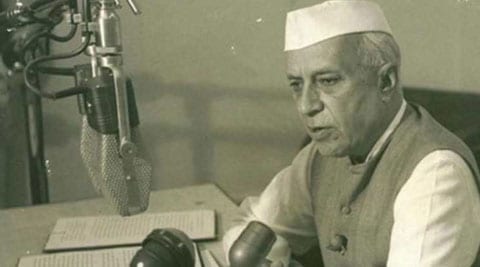Inder
Malhotra

The Indian Express
The Indian Express
11 November
2014
In
Jawaharlal Nehru’s time, the expression “communicator” hadn’t come into vogue.
Yet British political scientist W.H. Morris-Jones said it all when he wrote
that Nehru “rules a country of continental size and bewildering diversities
with a microphone”. His tryst-with-destiny speech had already been hailed as
“one of the best in the 20th century”, and his extempore oration after the Mahatma’s
assassination came close to it. Nehru’s awesome record in speaking directly to
millions has already been written about. Parliament was, of course, so
important a forum for his constant dialogue with the country that it needs to
be discussed separately. The written word was also an effective instrument of
communication for him. Indeed, he wrote so enormously as to boggle the mind.
Fifty-seven volumes of his “Selected Works” — alas, not collective ones — have
brought the narrative only up to February 1960. Five volumes of his letters to
chief ministers, published only in the 1980s, are a treasure trove for the
historian. Someone has wisely decided to bring out a single-volume extracts
from these, appropriately titled Letters for a Nation.

To cap
it all, there was the Nehru Press Conference, a unique institution, the like of
which has never been seen since his passing. With rare exceptions, he regularly
held it once a month. The number of journalists being small at that time, until
the construction of Vigyan Bhavan, the press conference could easily take place
in a committee room in Parliament House, even though a contingent of senior
officers from the ministry of external affairs unfailingly joined the hack
pack. At Vigyan Bhavan, a commission room was enough.
Nehru
always arrived on the dot and asked what subjects we wanted to discuss. He
noted them serially and dealt with each at length, answering every question,
and then moved on to the next topic. Spiced with humour, his press conferences
used to be a combination of enlightenment and entertainment. Some members of
the fourth estate used the occasion for self-expression rather than for
eliciting information. This often led to hilarity. For instance, during a
discussion on some crisis in the Banaras Hindu University, K. Rangaswami of The
Hindu demanded that the word Hindu go from the university’s name. Another
journalist interjected: “Then so should the entire name of the gentleman’s
newspaper.” Nehru joined the ensuing laughter.
When, in 1957, at the height of the Cold War, the Communist
Party of India came to power in Kerala in a free and fair election, Delhi-based
foreign correspondents got alarmed. One of them asked at his press conference:
“Sir, what will happen when Kerala is repeated in all Indian states?” Nehru
smiled and with a brief pause, replied: “When that misfortune overtakes us, we
will deal with it.” After President Kennedy announced the “man on the moon”
mission, Lawrence P. Atkinson, an elderly journalist specialising in ferreting
out unusual news, asked Nehru: “Sir, not as prime minister…” Nehru interrupted
him to say that he had to act as prime minister, whereupon Atkinson pleaded:
“Please, sir, don’t spoil my question. All I am asking is that, not as prime
minister but as Jawaharlal Nehru, would you go to the moon for the sake of
world peace?” Nehru: “For the sake of peace, Jawaharlal will happily go to the
moon.” The next day it was front-page news the world over. On two occasions,
however, there was the outburst of the famous Nehru temper at the otherwise
genial press conferences. G.K. Reddy, then of Blitz, a Bombay tabloid now
defunct, and later a star of both The Times of India and The Hindu, was the
first to draw the lightning. After China’s People’s Liberation Army marched
into Lhasa and India protested strongly, Reddy somehow took the Chinese side.
Nehru was livid. “This man,” he said, “is either a fool or a knave or a
combination of both”, and much else. The next day, when the government’s
principal information officer sought permission to cancel the allotment of government
accommodation to Reddy, the prime minister reprimanded him. Eight years later,
it was my turn to be at the receiving end of Nehru’s fury. K. Subbaroyan, news
bureau chief of The Indian Express was also rebuked, but rather mildly, for
publishing an extract from Nehru’s monthly letter to chief ministers. My
“fault” was “graver”. I had published in my then paper, The Statesman, a
top-secret “interim” report of the first Law Commission pointing out that high
court judges were being appointed on the basis of “caste, nepotism and other
unworthy considerations”. The tongue-lashing Nehru gave me, I haven’t forgotten
till today. A senior editor rose to point out that it was wrong to lambast a
correspondent who had merely done his job. The PM should punish his cabinet
colleague who leaked the document. “You are right,” responded Nehru, “I have
already ordered an inquiry into the matter.” For three days, flat-footed jokers
from the Intelligence Bureau made my life miserable in rude and crude ways. On
the third evening, there was an investiture at Rashtrapati Bhavan, followed by
the usual tea party. At tea time, an aide of the prime minister came and told
Subbaroyan and me that the PM wanted to see us both in the adjoining room.
There Nehru put one hand on Subbaroyan’s shoulder and the other on mine, and
said: “I lose my temper often but never my sense of proportion. I am sorry some
fools from the IB have been troubling you. I have therefore called off the
inquiry. But for the sake of a scoop don’t overlook national interest.” Nehru’s
last press conference took place on May 22, 1964. A correspondent told him to
settle the succession issue within his lifetime. “My lifetime,” replied Nehru,
“is not ending that very soon.” Everyone present cheered him lustily. Sadly, he
had tempted fate.
The
writer is a Delhi-based political commentator.


कोई टिप्पणी नहीं:
एक टिप्पणी भेजें